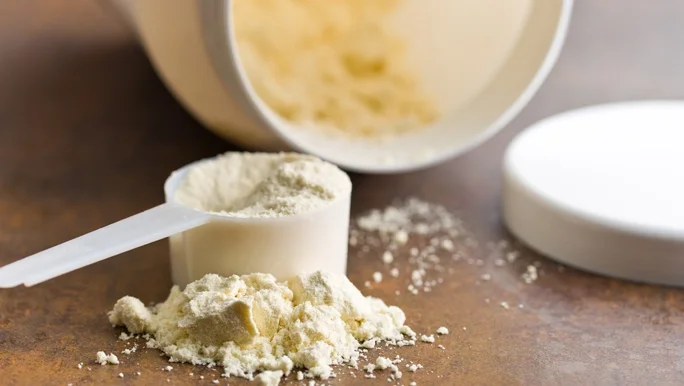One question we get asked frequently is – can you have protein powder on a low FODMAP diet? In short, yes, some protein powders are low FODMAP. The key is finding the right one for you, that you’re able to tolerate.
What is protein?
Protein forms an important part of a healthy diet. It is an essential nutrient made up of amino acids and plays a key role in building and repairing muscle, among other important functions.
Dietary sources of protein include lean meat, poultry, fish, eggs, milk, yoghurt, cheese, seeds, nuts, legumes and soy products. Protein powder supplements are another popular source of protein that many are choosing, particularly in recent years.
How much protein do we actually need?
This is different for everyone. Certain individuals have higher requirements such as athletes, growing children/adolescents, pregnant women, the elderly, and those who are recovering from illness/injury.
For your average adult, the guidelines recommend 15-25% of our total energy intake be from protein, or between 0.75-1.1g/kg/day to meet nutritional requirements.
Most of us will quite easily meet our protein requirements through a balanced diet, especially here in Australia.
Why are protein supplements so popular?
Many people may think protein powders are an essential gym accessory or a vital ingredient for achieving ‘them gains’. What many people don’t realise, or choose to ignore, is that getting protein from food sources is almost always more beneficial. This is because of all the additional nutrients found in the food. Protein from food is also usually better absorbed.
In saying that, protein shakes can be a convenient option, especially for those on the run. So, if you choose to have protein powders and have IBS, it is important you select a low FODMAP protein powder.
Whey Protein Powder
Whey protein is the most popular of the plethora of protein powders available. Like with cheese, whey protein powders should contain virtually no lactose as most is removed during processing.
Milk contains two types of protein; casein and whey. Whey is the liquid protein part of milk that is produced as a by-product when making cheese. Sooo…if whey comes from milk then surely you can’t have it on a low-FODMAP diet? Not necessarily!
Concentrate versus Isolate
When choosing a whey protein powder, we suggest Whey Protein Isolate (WPI). This is because it has undergone extra filtering, removing the majority of the lactose.
Most WPI contains <1% lactose, so it should be tolerated by most individuals on a low-FODMAP diet. Only choose Whey Protein Concentrate (WPC) if it states it is lactose-free.
Some good WPI proteins to try:
Vegan Low FODMAP protein powers
Rice protein powder
Rice protein powder is low FODMAP and is suitable for those on a vegan diet. Some suitable options include:
Pea protein powder
Whilst peas are high FODMAP food, pea protein powder has been tested as low FODMAP at a 2 Tbsp (40g) serve. It is suitable for those on a vegan diet. Some suitable options include:
Hemp protein powder
Hemp protein is made from hemp seeds which have been tested as low FODMAP at a 2 Tbsp (20g) serve.
The moderate FODMAP content of hemp seeds is a 50g serve.
Whilst hemp protein powder itself has not been tested, it should be fine at a 20g serve.
Due to its strong flavour, hemp protein is ideal for smoothies. Some suitable hemp protein powders are suitable are:
Is soy protein powder low FODMAP?
Whilst soybeans are high FODMAP, soy protein powders MAY be ok due to the processing undertaken, however, it may be best to avoid these.
Always check the label
As with any low FODMAP diet, everyone is different and some will tolerate some proteins better than others.
Always check the label, especially for flavoured variants. Some key ingredients to be cautious of are artificial sweeteners ending in ‘ol’ e.g malitol, xylitol etc.
Soy (usually soy lecithin) is often added, if in trace amounts it should be ok but if it's high up in the ingredients list then avoid the product. Others to beware of include inulin, coconut, and almond meal (usually in vegan protein).
Need help with the low FODMAP diet? Our FREE dietitian developed program will guide you through it, step-by-step. Includes a low FODMAP food guide. Sign up now.
If you are experiencing gut symptoms and have not been recommended a low FODMAP diet by a health professional, get started with the manage your gut symptoms program.
Reviewed by the healthylife Advisory Board March 2022
